广州版小学英语六年级上册
- 格式:doc
- 大小:121.00 KB
- 文档页数:7
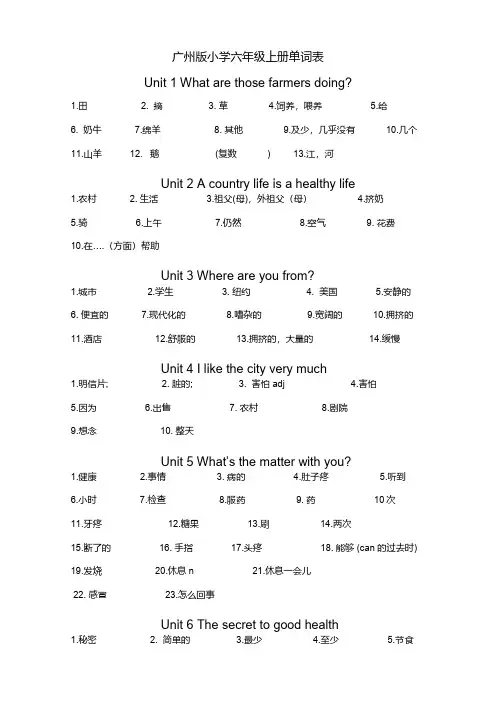
广州版小学六年级上册单词表Unit 1 What are those farmers doing?1.田2. 摘3. 草4.饲养,喂养5.给6. 奶牛7.绵羊8. 其他9.及少,几乎没有 10.几个11.山羊 12. 鹅 (复数 ) 13.江,河Unit 2 A country life is a healthy life1.农村2. 生活3.祖父(母),外祖父(母)4.挤奶5.骑6.上午7.仍然8.空气9. 花费10.在….(方面)帮助Unit 3 Where are you from?1.城市2.学生3. 纽约4. 美国5.安静的6. 便宜的7.现代化的8.嘈杂的9.宽阔的 10.拥挤的11.酒店 12.舒服的 13.拥挤的,大量的 14.缓慢Unit 4 I like the city very much1.明信片;2. 脏的;3. 害怕 adj4.害怕5.因为6.出售7. 农村8.剧院9.想念 10. 整天Unit 5 What’s the matter with you?1.健康2.事情3. 病的4.肚子疼5.听到6.小时7.检查8.服药9. 药 10次11.牙疼 12.糖果 13.刷 14.两次15.断了的 16. 手指 17.头疼 18. 能够 (can 的过去时) 19.发烧 20.休息 n 21.休息一会儿22. 感冒 23.怎么回事Unit 6 The secret to good health1.秘密2. 简单的3.最少4.至少5.节食6.较少的7.多油的8.最后地9.甚至10.微笑 11. 保持一个良好的饮食习惯Unit 7 What did you do yesterday?1.经验2.昨天3.生气的4.来(come的过去时)5.可怜的6. 最近的7. 年8.一点都不9. buy的过去式 10. meet的过去式 11. see的过去式12. read的过去式 13.助动词,do/does 的过去时 14.年Unit 8 A trip to Hong Kong1.迪士尼公园2.米老鼠3.唐老鸭4.后来5. feel的过去式6.直到7.更好的8.惊讶的 9. sit的过去式 10 are 的过去时Unit 9 Was I a good girl back then?1.当时,过去那个时候2.有礼貌的3.浏览4. 因特网5. 上网 6肥胖的 7.哭Unit 10 Then and now1. ……之前2.村子3. 附近4.遥远5.办公室6.商店7.百货公司8.当时9.卡通片Unit 11 I like the Spring Festival best1.他们的2.礼物3.幸运的4. 相互5.希望6.月饼7. 月亮8. 龙9.粽子 10. 比赛11. 压岁钱 12中秋节 13. 端午节 14.重阳节Unit 12 Other festivals in China1.月亮的2.庆祝3.记住4.古代的5.诗人6.豆7. 竹子8.欢呼9.重聚 10.灯笼。
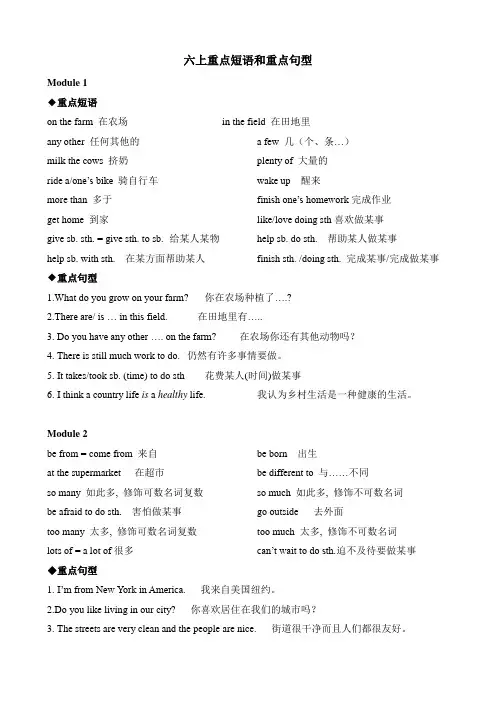
六上重点短语和重点句型Module 1◆重点短语on the farm 在农场in the field 在田地里any other 任何其他的 a few 几(个、条…)milk the cows 挤奶plenty of 大量的ride a/one’s bike 骑自行车wake up 醒来more than 多于finish one’s homewor k完成作业get home 到家like/love doing sth喜欢做某事give sb. sth. = give sth. to sb. 给某人某物help sb. do sth. 帮助某人做某事help sb. with sth. 在某方面帮助某人finish sth. /doing sth. 完成某事/完成做某事◆重点句型1.What do you grow on your farm? 你在农场种植了….?2.There are/ is … in this field. 在田地里有…..3. Do you have any other …. on the farm? 在农场你还有其他动物吗?4. There is still much work to do. 仍然有许多事情要做。
5. It takes/took sb. (time) to do sth 花费某人(时间)做某事6. I think a country life is a healthy life. 我认为乡村生活是一种健康的生活。
Module 2be from = come from 来自be born 出生at the supermarket 在超市be different to 与……不同so many 如此多, 修饰可数名词复数so much 如此多, 修饰不可数名词be afraid to do sth. 害怕做某事go outside 去外面too many 太多, 修饰可数名词复数too much 太多, 修饰不可数名词lots of = a lot of很多can’t wait to do sth.迫不及待要做某事◆重点句型1. I’m from New York in America. 我来自美国纽约。
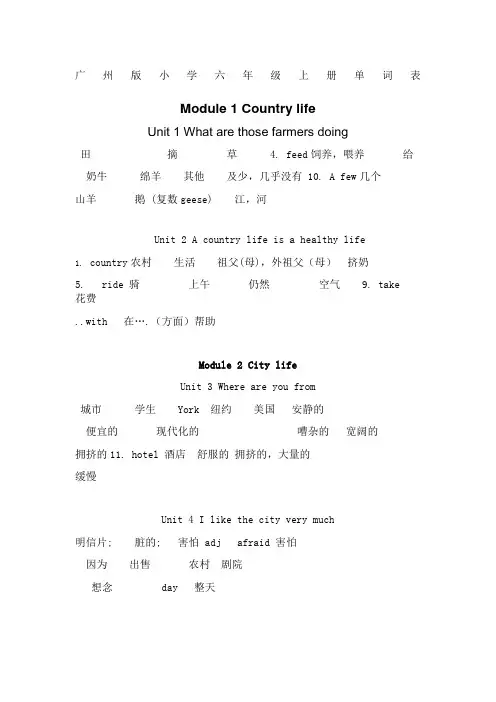
广州版小学六年级上册单词表Module 1 Country lifeUnit 1 What are those farmers doing田摘草 4. feed饲养,喂养给奶牛绵羊其他及少,几乎没有 10. A few几个山羊鹅 (复数geese) 江,河Unit 2 A country life is a healthy life1.country农村生活祖父(母),外祖父(母)挤奶5. ride 骑上午仍然空气 9. take 花费..with 在….(方面)帮助Module 2 City lifeUnit 3 Where are you from城市学生 York 纽约美国安静的便宜的现代化的嘈杂的宽阔的拥挤的11. hotel 酒店舒服的拥挤的,大量的缓慢Unit 4 I like the city very much明信片; 脏的; 害怕 adj afraid 害怕因为出售农村剧院想念 day 整天Unit 5 What’s the matter with you健康事情病的肚子疼听到小时 7. check-up 检查服药药 10 time次牙疼糖果刷两次断了的手指头疼能够 (can 的过去时)发烧休息 n a rest 休息一会儿a cold 感冒 23. What’s the matter 怎么回事Unit 6 The secret to good health秘密简单的最少 least 至少节食较少的多油的最后地甚至微笑 a good diet 保持一个良好的饮食习惯Module 4 Past experiencesUnit 7 What did you do yesterday经验 2. yesterday 昨天生气的来(come的过去时) 可怜的最近的年 not at all 一点都不 9. bought buy的过去式 meet的过去式see的过去式12. read read的过去式助动词,do/does 的过去时年Unit 8 A trip to Hong Kong迪士尼公园 Mouse米老鼠 Duck 唐老鸭后来 feel的过去式直到更好的8. surprised惊讶的 sit的过去式 10 were are 的过去时Unit 9 Was I a good girl back thenthen 当时,过去那个时候 2. polite有礼貌的浏览因特网the Internet 上网肥胖的哭Unit 10 Then and now1. ago ……之前村子 by 附近 away遥远办公室商店 store百货公司当时 9. cartoon 卡通片Module 6 FestivalUnit 11 I like the Spring Festival best他们的礼物 3. lucky幸运的 other 相互希望月饼月亮龙 9. zongzi粽子比赛 money 压岁钱12 Mid-autumn Festival中秋节 Boat Festival 端午节Festival重阳节Unit 12 Christmas分享奇妙的匆忙带来火腿火鸡 up 竖起。
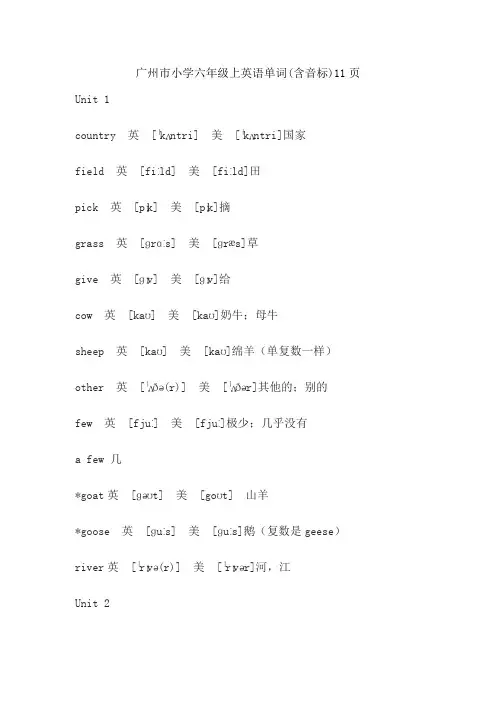
广州市小学六年级上英语单词(含音标)11页Unit 1country 英[ˈkʌntri] 美[ˈkʌntri]国家field 英[fiːld] 美[fiːld]田pick 英[pɪk] 美[pɪk]摘grass 英[ɡrɑːs] 美[ɡræs]草give 英[ɡɪv] 美[ɡɪv]给cow 英[kaʊ] 美[kaʊ]奶牛;母牛sheep 英[kaʊ] 美[kaʊ]绵羊(单复数一样)other 英[ˈʌðə(r)] 美[ˈʌðər]其他的;别的few 英[fjuː] 美[fjuː]极少;几乎没有a few 几*goat英[ɡəʊt] 美[goʊt] 山羊*goose 英[ɡuːs] 美[ɡuːs]鹅(复数是geese)river英[ˈrɪvə(r)] 美[ˈrɪvər]河,江Unit 2grandparents英['græn(d)peər(ə)nts] 美['græn'pɛrənts]祖父(母)milk英[mɪlk] 美[mɪlk]牛奶ride英[raɪd] 美[raɪd]骑(过去式是rode)take英[teɪk] 美[teɪk]花费(过去式是took)still英[stɪl] 美[stɪl]仍然help...with...在......(方面)帮助air 英[eə(r)] 美[er]空气Unit 3city 英[ˈsɪti] 美[ˈsɪti]城市student 英[ˈstjuːdnt] 美[ˈstuːdnt]学生quiet 英[ˈkwaɪət] 美[ˈkwaɪət]安静的cheap 英[tʃiːp] 美[tʃiːp]便宜的modern 英[ˈmɒdn] 美[ˈmɑːdərn]现代化的noisy 英[ˈnɔɪzi] 美[ˈnɔɪzi]嘈杂的wide 英[waɪd] 美[waɪd]宽阔的crowded 英[ˈkraʊdɪd] 美[ˈkraʊdɪd]拥挤的comfortable 英[ˈkʌmftəbl; ˈkʌmfətəbl] 美[ˈkʌmftəbl; ˈkʌmfərtəbl]舒服的heavy 英[ˈhevi] 美[ˈhevi]大量的slow 英[sləʊ] 美[sloʊ]慢的Unit 4postcard 英[ˈpəʊstkɑːd] 美[ˈpoʊstkɑːrd]明信片different to... 不同于...dirty英[ˈdɜːti] 美[ˈdɜːrti] 脏的afraid 英[əˈfreɪd] 美[əˈfreɪd害怕be afraid... 美[bi əˈfreɪd]害怕 ...because 英[bɪˈkəz; bɪˈkɒz] 美[bɪˈkəz; bɪˈkɔːz]因为sell 英[bɪˈkəz; bɪˈkɒz] 美[bɪˈkəz; bɪˈkɔːz]出售countryside 英[ˈkʌntrisaɪd] 美[ˈkʌntrisaɪd]农村theatre 英[ˈθɪətə(r)] 美[ˈθiːətər]剧院all day all day整天Unit 5health 英[helθ] 美[helθ]健康matter 英[ˈmætə(r)] 美[ˈmætər]事情What's the matter? 怎么回事?ill 英[ɪl] 美[ɪl]病的stomachache 英[ˈstʌməkeɪk] 美[ˈstʌməkˌeɪk]胃疼ate 英[et; eɪt] 美[eɪt]吃hear 英[hɪə(r)] 美[hɪr]听到I’m sorry to hear that 听到这个我感到很难过gave 英[ɡeɪv] 美[ɡeɪv]给check-up 英[ˈtʃek ʌp] 美[ˈtʃek ʌp]检查take 英[teɪk] 美[teɪk]服medicine英[ˈmedsn; ˈmedɪsn] 美[ˈmedɪsn] 药time time次toothache 英[ˈtuːθeɪk] 美[ˈtuːθeɪk]牙疼brush 英[brʌʃ] 美[brʌʃ]刷twice 英[twaɪs] 美[twaɪs]两次broken 英[ˈbrəʊkən] 美[ˈbroʊkən]断了finger 英[ˈfɪŋɡə(r)] 美[ˈfɪŋɡər]手指rest 英[rest] 美[rest]休息take a rest 休息have a cold 感冒wore 英[wɔː(r)] 美[wɔːr]穿headache 英[ˈhedeɪk] 美[ˈhedeɪk]头疼could 能够fever 英[ˈfiːvə(r)] 美[ˈfiːvər]发烧Unit 6secret 英[ˈsiːkrət] 美[ˈsiːkrət]秘密simple 英[ˈsɪmpl] 美[ˈsɪmpl]简单的least 英[liːst] 美[liːst]最少at least 至少*diet 英[ˈdaɪət] 美[ˈdaɪət]节食*keep a good diet 保持一个良好的饮食习惯less 英[les] 美[les]较少的oily 英[ˈɔɪli] 美[ˈɔɪli]多油的finally 英[ˈfaɪnəli] 美[ˈfaɪnəli]最后地smile 英[smaɪl] 美[smaɪl]微笑even 英[ˈiːvn] 美[ˈiːvn]甚至Unit 7☆past 英[pɑːst] 美[pæst]过去☆experience 英[ɪkˈspɪəriəns] 美[ɪkˈspɪriəns]经验yesterday 英[ˈjestədeɪ; ˈjestədi] 美[ˈjestərdeɪ; ˈjestərdi]昨天bought 英[bɔːt] 美[bɔːt]买angry 英[ˈæŋɡri] 美[ˈæŋɡri]生气的came 来(come的过去式)no/not...at all 一点都不……poor 英[pɔː(r); pʊə(r)] 美[pʊr; pɔːr]可怜的last 英[lɑːst] 美[læst]最近的year 英[jɪə(r); jɜː(r)] 美[jɪr]年met 英[met] 美[met]遇见saw 英[sɔː] 美[sɔː]看见read 英[riːd] 美[riːd]读Unit 8diary 英[ˈdaɪəri] 美[ˈdaɪəri]日记*Disneyland 英[ˈdɪznilænd]美[ˈdɪznilænd]迪士尼公园*Mickey mouse 米老鼠*Donald Duck 唐老鸭a little 一点later 英[ˈleɪtə(r)] 美[ˈleɪtər]后来felt 英[felt] 美[felt]感觉(feel的过去式)sat 英[sæt]美[sæt]坐(sit的过去式)until 英[ənˈtɪl] 美[ənˈtɪl]直到better 英[ˈbetə(r)] 美[ˈbetər]更好surprised 英[səˈpraɪzd] 美[sərˈpraɪzd]惊讶Unit 9back then 当时polite 英[pəˈlaɪt] 美[pəˈlaɪt]有礼貌的*surf 英[sɜːf] 美[sɜːrf]浏览*Internet 英[ˈɪntənet] 美[ˈɪntərnet]因特网*surf the Internet 上网fat 英[fæt]美[fæt]肥胖的cry 英[kraɪ] 美[kraɪ]哭Unit 10ago 英[əˈɡəʊ] 美[əˈɡoʊ]……之前village village村子nearby 英[ˌnɪəˈbaɪ] 美[ˌnɪrˈbaɪ]遥远far away 遥远office office办公室store 英[stɔː(r)] 美[stɔːr]商店*department store 百货公司Unit 11each other 互相gift 英[ɡɪft] 美[ɡɪft]礼物lucky 英[ˈlʌki] 美[ˈlʌki]幸运的lucky money 压岁钱wish 英[wɪʃ] 美[wɪʃ]希望*jiaozi 饺子*Mid-autumn Festival 中秋节moon英[muːn] 美[muːn] 月亮mooncake 英['mu:nkeɪk] 美[ˈmuːnkeɪk]月饼*dragon 龙*Dragon Boat Festival 端午节*zongzi 粽子race 英[reɪs] 美[reɪs]比赛*Chongyang Festival 重阳节Unit 12put up 美[pʊt ʌp]竖起share 英[ʃeə(r)] 美[ʃer]分享wonderful 英[ˈwʌndəfl] 美[ˈwʌndərfl]奇妙的hurry 英[ˈhʌri] 美[ˈhɜːri]匆忙bring 英[brɪŋ] 美[brɪŋ]带来(过去式是brought)*ham ham火腿*turkey 英[ˈtɜːki] 美[ˈtɜːrki]火鸡。
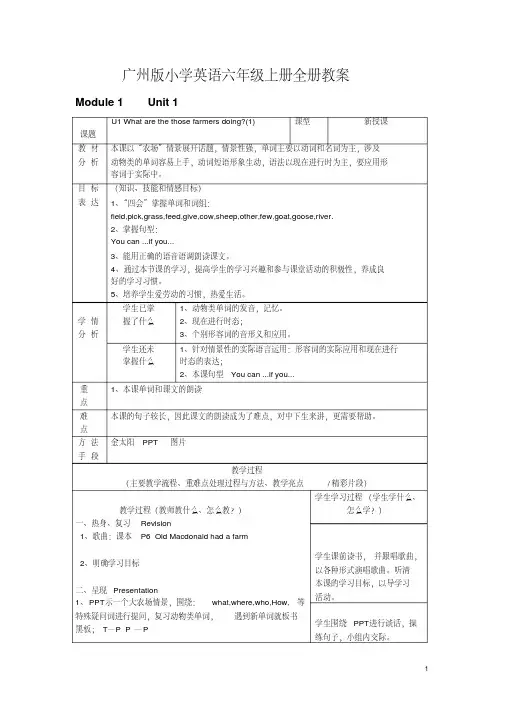
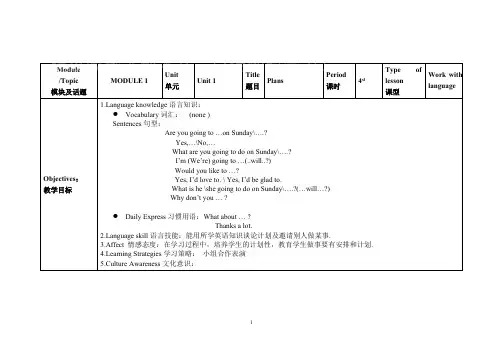
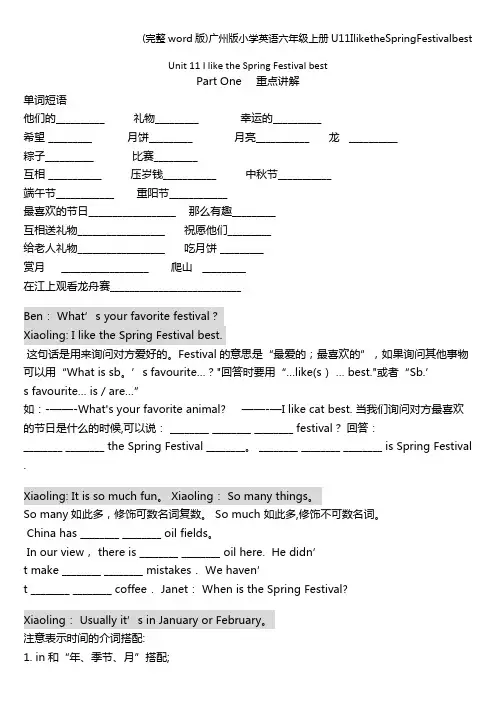
Unit 11 I like the Spring Festival bestPart One 重点讲解单词短语他们的__________ 礼物_________ 幸运的__________希望 _________ 月饼_________ 月亮___________ 龙 __________粽子__________ 比赛_________互相 ___________ 压岁钱___________ 中秋节___________端午节____________ 重阳节____________最喜欢的节日__________________ 那么有趣_________互相送礼物__________________ 祝愿他们_________给老人礼物__________________ 吃月饼 _________赏月 __________________ 爬山 _________在江上观看龙舟赛___________________________Ben: What’s your favorite festival?Xiaoling: I like the Spring Festival best.这句话是用来询问对方爱好的。
Festival的意思是“最爱的;最喜欢的”,如果询问其他事物可以用“What is sb。
’s favourite…?"回答时要用“…like(s)… best."或者“Sb.’s favourite… is / are…”如:-——-What's your favorite animal? ——-—I like cat best. 当我们询问对方最喜欢的节日是什么的时候,可以说: ________ ________ ________ festival?回答:________ ________ the Spring Festival ________。
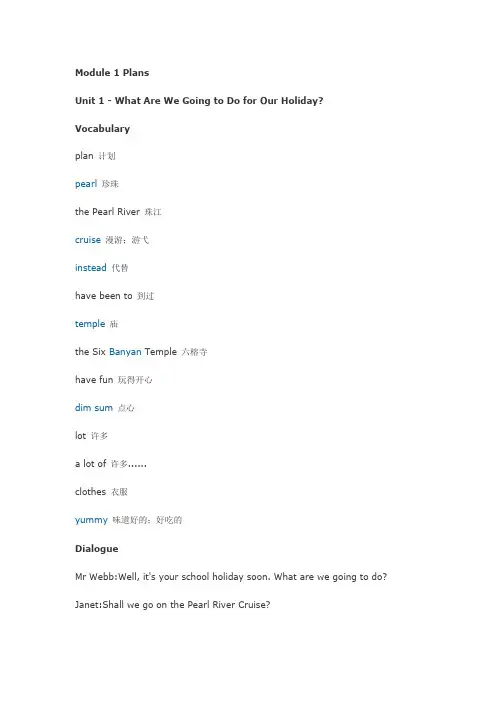
Module 1 PlansUnit 1 - What Are We Going to Do for Our Holiday?Vocabularyplan 计划pearl珍珠the Pearl River 珠江cruise漫游;游弋instead代替have been to 到过temple庙the Six Banyan Temple 六榕寺have fun 玩得开心dim sum点心lot 许多a lot of 许多......clothes 衣服yummy味道好的;好吃的DialogueMr Webb:Well, it's your school holiday soon. What are we going to do? Janet:Shall we go on the Pearl River Cruise?Ben:A cruise? Boring! Let's go to Xiangjiang Zoo instead! I'm going to see white tigers.Janet:Oh no. We have been to the zoos in Guangzhou many times. We're going to the Six Banyan Temple. We're going to take photos, and all of us are going to have fun there.Ben:It's boring too.Mr Webb:Let's go to Baiyun Hill. We are going to watch birds there.Janet:We can see more birds at the zoo than on Baiyun Hill.Mrs Webb:Shall we go shopping in Xiajiu Road? Then we can have dim sum at the famous Guangzhou Restaurant.Janet:Good idea! I want to buy some new clothes. There are a lot of beautiful clothes there.Ben:Great! I like Guangdong dim sum. Yummy, yummyUnit 2 What Shall We Do?go fishing 去钓鱼love 爱stupid愚蠢的on 上演tonight今晚;在今晚king国王DialogueJanet:What are you going to do on Thursday morning, Xiaoling?Xiaoling:Mmm...let me see. I'm not going to do anything. Why?Janet:My family are going fishing. Would you like to go with us?Xiaoling:I'd love to, thanks a lot. When are you going to start?Janet:We are going to leave our house at half past eight. Why don't you come to our house at twenty past eight?Xiaoling:Great! I'll see you then!Jiamin:Are you going to watch the footfall game on TV tomorrow evening, Ben?Ben:Yes, we are. I'm going to watch it together with Mike and Yongxian.Jiamin:My family are watching a stupid film when the football game is on. So I can't watch it.Ben:Why don't you come to my house to watch it? We're going to have dinner before the game. You can eat with us too.Jiamin:Thanks. Ben. I'll ask my parents.Xiaolin:Janet, do you want to play table tennis with me tonight?Janet:I'm sorry, I can't. I'm going to do my homework.Xiaoling:What about tomorrow night?Janet:I'm sorry, I can't. I'm going swimming with my parents.Xiaoling:What about Saturday night?Janet:To tell you the truth, I don't like playing table tennis. I'm going to the cinema with Ben tonight!Sally:What film are you going to see?Janet:The Lion King.Sally:Can I go with you?Janet:Yes, of course. But you'd better ask your parents first.Unit Four - I Know This City!flag 旗national国家的;民族的national flag 国旗capital首都Italian 意大利的;意大利语;意大利人Italy 意大利Rome 罗马Paris 巴黎America 美国;美洲Washington D.C. 华盛顿哥伦比亚区New York 纽约excellent极好的;优秀Tokyo 东京Wellington 惠灵顿Sydney 悉尼Canberra 堪培拉DialogueLook and listen. Then read and act in groups.Mr Chen: Boys and girls, look at this flag please. What national flag is it? Ben: Easy! It's the Chinese national flag.Mr Chen: Good. What's the capital of China?Ben: That's easy too. The capital of China is Beijing.Mr Chen: Very good. Look at these three flags. What national flags are they? Janet: That's the national flag of the UK. The capital of the UK is London. Xiaoling: That is the Italian national flag.Mr Chen: What's the capital city of Italy, do you know?Yongxian: I know, Mr Chen. It's Rome.Janet: And that's the French national flag. The capital of France is Paris.Mr Chen: Excellent! What about this one?Jiamin: That's the American national flag. New York is the capital of America.Sally: No. The capital of the USA is Washington D.C.. New York is the biggest city of the USA.Mr Chen: Fantastic! Look at this flag. What flag is it, Janet?Janet: It's the national flag of Australia?Mr Chen: What's the capital of Australia?Janet: Sydney.Mr Chen: No. Sydney is the largest city of Australia. The capital of Australia is Canberra.Unit 5 Where Would They Like to Go On Holiday?maybe 可能noisy 吵闹的crowded拥挤的quiet 安静的just 仅仅;正;恰好;刚Moscow 莫斯科Russia 俄罗斯Berlin 柏林the Great Wall 长城mountain山;山脉population人口million百万DialogueMr Webb:Children, where would you llike to go on holiday this summer? Ben:I'd like to go to Japan.Mrs Webb:Tokyo. Yes, Tokyo is a good place to visit.Janet:Yes, Mum. But Paris is more beautiful than Tokyo.Mrs Webb:Well, maybe, Janet. But I think Tokyo is more interesting than Paris.Mr Webb:Well, I'd like go to a warmer place. What about Rome? Rome is warmer than Paris.Nrs Webb:Yes, but Tokyo, Paris and Rome are so noisy and crowded. What about Wellington?Ben:Wellington? That's the capital of New Zealand.Mrs Webb:Yes. Wellington is quieter than the other cities. I'd like to go to Wellington.Ben:But Wellington is boring!Mr Webb:No, it's not. The mountains and the sea are beautiful.Mrs Webb:And Willington is cleaner than Tokyo.Ben:Maybe. But I prefer to go to Tokyo.Mrs Webb:There are so many beautiful places in the world! Where shall we go?Janet:Well, I'd like to go to Paris.Ben:I'd like to go to Tokyo.Mr Webb:I'd like to go to Rome.Mrs Wedd:I'd like to go to Wellington.Janet:Why don't we go back to England?Ben:Let's just visit Beijing. We can visit the Great Wall!All:That's a good idea!Unit Seven - Ben Wants to Play Footballbored厌烦的away 离开go away 走开later以后won't=will not 将不poor可怜的match比赛circus马戏团go boating 去划船go swimming 去游泳come to tea 来喝茶DialogueMr Webb:What's the matter, Ben? You don't look happy.Ben:I'm bored! Dad, do you want to play football?Mr Webb:We can't! It's raining.We'll get wet.Ben:Oh, dad! Janet, shall we go to see the film The Lion King? It's really good. Janet:No, I'm watching TV.Ben:But I'm bored. Would you like to go to the cinema with me?Janet:Well, maybe later.Ben:Oh, Mum, I'm so bored. It's raining and dad won't play football with me. Mrs Webb:And what about Janet?Ben:She's watching TV.Mrs Webb:Poor Ben.Mrs Webb:I'm going shopping now. Ben, do you want to go with me?Ben:Er… no, thanks, Mum.Mrs Webb:Are you sure? We could buy hamburgers for lunch.Ben:But Mum, I don't like shopping! It's so boring!Ben:Hi, Mike, what are you doing?Mike:Hi, Ben. I'm doing nothing. I'm really bored. Would you like to come to my house? We could play computer games.Ben:Great! Dad, can I go to Mike's house?Mr Webb:Of course you can!Unit 8 - Janet Is Going to Have a PartyVocabularyinvite邀请picnic野餐outside外面,在外面bring 带来CD 激光唱片VCD 可视激光光盘problem问题DialogueJanet:Mum.Mrs Webb:Yes, Janet?Janet:It's my brithday soon.Mrs Webb:Yes, it is. What would you like to do? Would you like to have a party?Janet:Oh, yes, please, Mum! A big party! Can we invite all my friends? And all the people in my class? And my teacher too?Mrs Webb:Well, maybe. Let's ask your father.Mr Webb:That's a lot of people! Our house is too small!Janet:Oh please! I want them all to come!Mrs Webb:Well, maybe we could have a picnic outside.Janet:Yes! Yes! A picnic would be great! Oh please, Dad!Mr Webb:OK then. But you have to help your mother, Janet.Janet:Oh yes, of course!Janet:It's my birthday next Saturday. I'm going to have a big party! Would you like to come?Sally:I'd love to. Shall I bring some food?Janet:No, it's OK. My Mum will make all the food. But you can bring some Coke. Sally:Right. What time is the party?Janet:It starts at one o'clock. See you then!Sally:See you.Ben:Janet, would you like to come and listen to my new CD?Janet:No, thanks, Ben. I don't like your CDs.Ben:Janet, do you want to play computer games with me? Janet:No, thanks, Ben. I'm reading!Ben:Janet…Janet:Oh, all right, Ben! Do you want to come to my party? Ben:Great! Can I bring a friend?Janet:Who?Ben:Billy, the alien.Janet:The alien? No problem!Unit 10 - May I speak to Miss White?Vocabularytelephone电话,打电话afraid恐怕,害怕message消息,消息take a message 传递消息were 是(are的过去式)weren't=were not 不是was 是(am, is的过去式)doll玩具娃娃free 有空的,自由的bookstore书店answer 回答busy 忙的DialogueMrs White:Hello. This is Mrs White speaking.Xiaoling:May I speak to Miss White?Mrs White:She's not here, I'm afraid.Xiaoling:When will she come back?Miss White:At lunch time, I think. Can I take a message for her?Xiaoling:No, thanks.Miss White:Hello.Xiaoling:Hello. Can I speak to Miss White?Miss White:Speaking. Who's that, please?Xiaoling:It's Xiaoling here.Miss White:Hello, Xiaoling. How are you?Xiaoling:Very well, thanks. And you?Miss White:I'm fine too. Thanks.Xiaoling:I called you this morning. But you weren't at home.Miss White:Sorry. I was at school this morning.Xiaoling:It's my brithday this Saturday. I'm having a big party at home. Would you like to come?Miss White:I'd love to. At what time is the party? Xiaoling:We'll start at one o'clock. See you this Saturday! Miss White:See you then.。
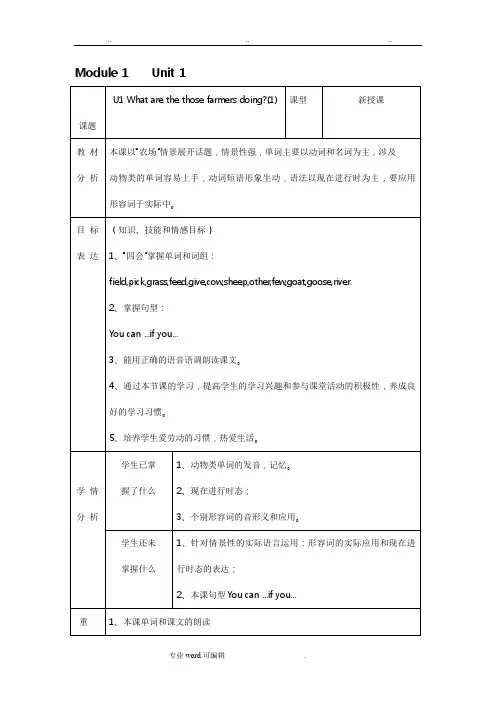
Module 1 Unit 1Module2 Citie life 一、教学内容分析本模块的话题涉及城市的生活。
在第三单元里面,出现了一个新学生David,他给班上的同学介绍了他在纽约的生活。
在第四单元里,是一张Li Wei 写给Lily的明信片。
在这张明信片黎,Li WeI 描述了她在城市里假期生活。
二、语法和交际用语1、询问比人来自哪里及回答:Where are you from? I am from(New York City in America)。
2、谈论一个城市:A: What’s … like? B: Do you like living in our city? 运用形容词来描述一个城市,如:It’s a big and modern city.3、祈使句的使用:Don’t take photots here.4、交际用语:I can’t wait to (get back home) I eally miss….三、教学目标1.词汇(1)“四会”掌握词汇:city, student, New York, America, quiet, cheap, modern, noisy, wide, crowded, hotel, comfortable, heavy, slow, postcard, dirty, afraid, be afraid, because, sell. Countryside, theatre, all day, miss(2)“三会”掌握词汇:was, be born, expensive, street, supermarket, traffic, holiday, different to , outside,2.“四会”掌握句型:1、Where is /are from…?2、hat’s… like?3、It’very different to…4、…be afraid to do something…5、There is much more to do ,,, than…6、…can’t wait fo…(二)语言技能目标1.能够按“四会”和“三会”的要求运用本模块的单词。
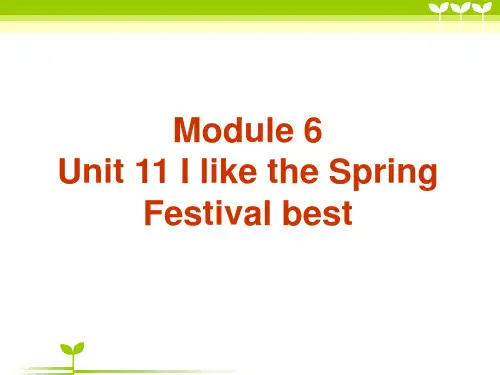
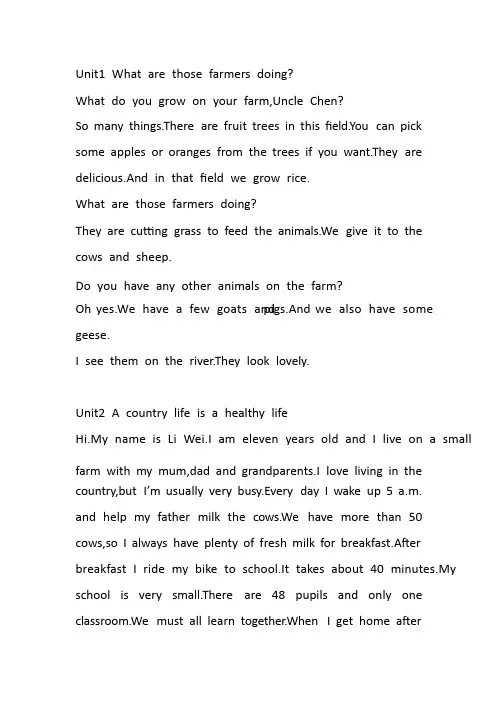
Unit1 What are those farmers doing? What do you grow on your farm,Uncle Chen? So So many many many things.There things.There things.There are are are fruit fruit fruit trees trees trees in in in this this this field.You field.You field.You can can can pick pick some some apples apples apples or or or oranges oranges oranges from from from the the the trees trees trees if if if you you you want.They want.They want.They are are delicious.And in that field we grow rice. What are those farmers doing? They They are are are cu ng cu ng cu ng grass grass grass to to to feed feed feed the the the animals.We animals.We animals.We give give give it it it to to to the the cows and sheep. Do you have any other animals on the farm? Oh yes.We have a few goats and pigs.And we also have some geese. I see them on the river.They look lovely. Unit2 A country life is a healthy life Hi.My name is Li Wei.I am eleven years old and I live on a small farm farm with with with my my my mum,dad mum,dad mum,dad and and and grandparents.I grandparents.I grandparents.I love love love living living living in in in the the country,but country,but I I ’m m usually usually usually very very very busy.Every busy.Every busy.Every day day day I I I wake wake wake up up up 5 5 5 a.m. a.m. and and help help help my my my father father father milk milk milk the the the cows.We cows.We have have more more more than than than 50 50 cows,so cows,so I I I always always always have have have plenty plenty plenty of of of fresh fresh fresh milk milk milk for for for breakfast.A er breakfast.A er breakfast I ride my bike to school.It takes about 40 minutes.My school is very small.There are 48 pupils and only one classroom.We classroom.We must must must all all all learn learn learn together.When together.When I I get get get home home home a er a er school,there is s ll much work to do.A er I finish my homework,I feed our chickens and help my parents with other housework.I housework.I am am am always always always busy busy busy but but but I I I never never never feel feel feel red,because red,because red,because I I have plenty of exercise,clean air and fresh food every day.So I think a country life is a healthy life. Unit3 Where are you from? Children.We have a new student in our class.This is David. Hi,David.Where are you from? I ’m from New Youk City in America.I was born there. Do you like living in our city? Oh,yes.It Oh,yes.It is is small but quiet.The quiet.The streets streets streets are are very clean and the people are nice.Things here are cheap,too. What What’’s New York like? It It’’s big big and and and modern modern modern city city city but but but it it it’’s s quite quite quite noisy.And noisy.And noisy.And everything everything everything is is very expensive in New York. Unit4 I like the city very much Dear Lily, My holiday holiday in in the city is very interes ng.It is very different different to to our our home home home on on on the the the farm.In farm.In farm.In the the the city,there city,there city,there are are are so so so many many many cars.The cars.The traffic is very heavy and the streets are crowded and dirty.Some mes dirty.Some mes I I am am afraid afraid afraid to to to go go go outside.And outside.And outside.And It It is very very noisy noisy too.At too.At night,I night,I night,I can can can’’t t go go go to to to sleep sleep sleep because because because there there there are are are too too too many many cars.But cars.But there there there are are are many many many nice nice nice things things things here here here too.There too.There too.There are are are many many supermarkets supermarkets here here here and and and they they they sell sell sell lots lots lots of of of different different different things.There things.There are also many beau ful modern buildings.There is much more to do in the city than in the countryside.At home we have only one one shop shop shop and and and one one one cinema,but cinema,but cinema,but in in in this this this city city city there there there are are are many many theatres and parks.I can play all day.I like the city very much but I really miss you and the farm.I can ’t wait to get back home and see all my friends. Love, Li Wei Unit5 What ’s the ma er with you? Jiamin.You don Jiamin.You don’’t look well.What’s the ma er with you? I feel ill.I have a stomachache.Maybe I ate some bad food. I ’m sorry to hear that.You should see a doctor. I did.I went to the hospital this morning.I stayed there for two hours. And what did the doctor say? He He gave gave gave me me me a a a check-up check-up check-up and and and asked asked asked me me me to to to take take take this this this medicine medicine three mes a day for one week. You should be careful,Jiamin.Your health is very important. I think you ’ll be well soon. Thank you. Unit6 The secret to good health Mr Li is not a doctor or a nurse,but he knows the secret to good health.He is 80 years old but looks only 60.He says you can do some some simple simple simple things things things to to to stay stay stay healthy.First,get healthy.First,get healthy.First,get plenty plenty plenty of of of sleep,at sleep,at least least 8 8 8 hours hours hours each each each night,so night,so night,so you you you will will will feel feel feel good good good for for for the the the next next day.Second,keep a a good good good diet.Eat diet.Eat more more vegetables vegetables and and less less meat.Don meat.Don’’t eat eat too too too much much much sweet sweet sweet or or oily food.And food.And drink drink drink tea tea tea or or water,not coke coke or or or coffee.Third,take coffee.Third,take plenty plenty of of of exercise.Mr exercise.Mr Li walks for one hour in the park every morning and some mes dances dances with with with his his his friends friends friends there.Finally,Mr there.Finally,Mr Li Li thinks thinks thinks the the the most most important important thing thing thing for for for a a a healthy healthy healthy life life life is is is to to to be be be happy.He happy.He never worries worries too too too much much much and and and always always always has has has a a a smile smile smile on on on his his his face.That face.That ’s why,even at 80,his hair is s ll black and not white. Unit7 what did you do yesterday? Yestoday was Children ’s Day.Tell me,children,what did you do? I went shopping with my mother.I bought a new pair of sports shoes.Do you like them? They look great.I played basketball at the park.It was so much fun.But my mum was angry because I came home late. And you Ben?Where did you go yestoday? I stayed at home all day.In the morning I cleaned my room and in the a ernoon I did my homework.It was no fun at all. Poor Ben! Unit8 A trip to Hong Kong Dear Diary, Last weakend my mother,Ben and I went on a trip to Hong Kong.We travelled there by train and stayed with my cousin.Ben said said he he he was was was very very very excited excited excited because because because it it it was was was his his his first first first visit visit visit to to to the the island.On our first day my cousin took us to Disneyland.We took a photo with Mickey Mouse and Donald Duck and played lots of different games. We had hamburgers and chips for lunch.I think I I ate ate ate a a li le li le too too too much much much because because because later later later I I I felt felt felt ill.Ben ill.Ben ill.Ben sat sat sat with with with me me un l I felt be er.He was so kind.The next day we went shopping.When we were on the street,we met Xiaoling and her mum.I was very surprised because I didn ’t know they came to Hong Hong Kong,too.We Kong,too.We Kong,too.We all all all had had had lunch lunch lunch together together together and and and talk talk talk about about about our our trip. Unit9 Was I a good girl back then? Mum,who is that in the picture? That That’s you,when you were ’s you,when you were five years old. Really?My hair was very long then,wasn ’t it? Yes,it Yes,it was.Before,you was.Before,you was.Before,you liked liked liked long long long hair hair hair very very very much,but much,but much,but now now now you you always keep it short. Was I a good girl back then? Oh yes,a very good girl.When you were five,you were quiet and very polite.But now …But now?But now I am s ll very good!! Unit10 Then and now Three years ago,Ben came to live in China with his parents.Before then,he then,he lived lived in in England England England and and and life life was very different. When When he he he was was was in in in England,Ben England,Ben England,Ben lived lived lived in in in a a a small small small village village village in in in the the countryside.It countryside.It had had had only only only two two two shops shops shops and and and most most most of of of the the the people people worked on farms.Ben ’s village school was very small too.There were were only only only 150 150 150 pupils.His pupils.His pupils.His home home home was was was nearby nearby nearby so so so he he he walked walked walked to to school every day. But But now,Ben now,Ben now,Ben lives lives lives in in in a a a big big big city.The city.The city.The city city city has has has many many many people,cars people,cars and tall buildings.In the city,Ben goes to a very big school.It has more more than than than 1000 1000 1000 pupils.His pupils.His pupils.His home home home is is is far far far away,so away,so away,so every every every day day day he he takes takes the the the bus.On bus.On bus.On the the the bus,he bus,he bus,he sees sees sees people people people going going going to to to work work work in in modern office buildings and department stores. Ben loves the city.There are many things to do and he has lots of friends.But some mes he missed the quiet life of his English village. Unit11 I like the Spring Fes val best What is your favourite fes val,Xiaoling? I like the Spring Fes val best.It is so much fun. What do people do during the Spring Fes val? So many things.The Spring Fes val is the Chinese New Year,so people usually clean their houses and buy new clothes to make everything new and fresh. And do you give each other gi s? Children Children don don don’’t t give give give gi s,but gi s,but gi s,but parents parents parents will will will give give give their their their children children some lucky money.So we all love it. When is the Spring Fes val? Usually it is in January or February.We will go to visit our family and wish them a happy Spring Fes val.We will also have a big dinner with jiaozi and lots of other delicious food. It sounds great. Unit12 Christmas In In many many many countries,Christmas countries,Christmas countries,Christmas is is is the the the most most most important important important fes val fes val fes val of of the year.Christmas is always on December 25th,and before that day people will put up a large Christmas tree in their home.Under the Christmas tree they put many gi s for everyone to share.Children are always very excited at Christmas because because they they they can can can get get get many many many wonderful wonderful wonderful presents presents presents from from from Father Father Christmas.Father Christmas is a fat happy man in red clothes.He brings gi s to all the children.He comes to their home on the night before Christmas and puts their gi s under the tree or in a sock.Then sock.Then on on Christmas Christmas morning morning the children children hurry hurry to open their gi s.Families and friends come together on that day for a big Christmas lunch or dinner.They o en eat ham,potatoes and a a Christmas Christmas Christmas turkey.Everyone turkey.Everyone sings sings many many many wonderful wonderful wonderful Christmas Christmas songs.It really is a happy me. 。
广州版三年级起点小学英语六年级上(英语单词表,带发音)Unit 1 What are thosUnit 5 What's the macountry英音 [ˈk ʌntri]美音 [ˈk ʌntri]n. 国家,国土;国民;乡下,农村;乡村;故乡 adj. 祖国的,故乡的;地方的,乡村的;…field英音 [fi ːld]美音 [fi ːld]n. 领域;牧场;旷野;战场;运动场 adj. 扫描场;田赛的;野生的 vt. 把暴晒于场上;…pick英音 [p ɪk]美音 [p ɪk]n. 选择;鹤嘴锄;挖;掩护 vi. 挑选;采摘;挖 vt. 拾取;精选;采摘;掘grass英音 [ɡrɑːs]美音 [ɡræs]n. 草;草地,草坪 vt. 放牧;使……长满草;使……吃草 vi. 长草cow 英音 [ka ʊ]美音 [ka ʊ]n. 奶牛,母牛;母兽 vt. 威胁,恐吓sheep 英音 [ʃi ːp]美音 [ʃi ːp]n. 羊,绵羊;胆小鬼other英音 [ˈʌðə(r)]美音 [ˈʌðər]adj. 其他的,另外的 pron. 另外一个few英音 [fju ː]美音 [fju ː]n. 很少数 adj. 很少的;几乎没有的 pron. 很少a few na. 几个;〔反语〕很多;〈俚〉一点点goat英音 [ɡəʊt]美音 [go ʊt]n. 山羊;替罪羊(美俚);色鬼(美俚)goose英音 [ɡu ːs]美音 [ɡu ːs]n. 鹅;鹅肉;傻瓜;雌鹅 vt. 突然加大油门;嘘骂geese 英音 [ɡi ːs]美音 [ɡi ːs]n. 鹅(goose复数)river英音 [ˈr ɪv ə(r)]美音 [ˈr ɪv ər]n. 河,江Unit 2 A country lifUnit 3 Where are yougrandparent英音 [ˈɡrænpe ər ənt]美音 [ˈɡrænper ənt]n. 祖父母;祖父或祖母;外祖父母;外祖父或外祖母milk英音 [m ɪlk]美音 [m ɪlk]n. 牛奶;乳状物 vt. 榨取;挤…的奶 vi. 挤奶ride英音 [ra ɪd]美音 [ra ɪd]n. 骑;乘坐;交通工具;可供骑行的路;(乘坐汽车等的)旅行;乘骑;(乘车或骑车的…rode英音 [r əʊd]美音 [ro ʊd]v. 骑(ride的过去式)still英音 [st ɪl]美音 [st ɪl]conj. 仍然;但是;尽管如此 n. 寂静;剧照;蒸馏室 adj. 静止的,不动的;寂静的,平静…help ... with ...v. 帮助air英音 [e ə(r)]美音 [er]n. 空气,大气;天空;样子;曲调 vt. 使通风,晾干;夸耀 vi. 通风city 英音 [ˈs ɪti]美音 [ˈs ɪti]n. 城市,都市 adj. 城市的;都会的student英音 [ˈstju ːdnt]美音 [ˈstu ːdnt]n. 学生;学者quiet 英音 [ˈkwa ɪət]美音 [ˈkwa ɪət]n. 安静;和平 adj. 安静的;安定的;不动的;温顺的 vt. 使平息;安慰 vi. 平静下来cheap 英音 [t ʃi ːp]美音 [t ʃi ːp]adj. 便宜的;小气的;不值钱的 adv. 便宜地modern英音 [ˈm ɒdn]美音 [ˈmɑːd ərn]adj. 现代的,近代的;时髦的 n. 现代人;有思想的人noisy英音 [ˈn ɔɪzi]美音 [ˈn ɔɪzi]adj. .嘈杂的;喧闹的;聒噪的wide英音 [wa ɪd]美音 [wa ɪd]n. 大千世界 adj. 广泛的;宽的,广阔的;张大的;远离目标的 adv. 广泛地;广阔地;充…crowded英音 [ˈkra ʊd ɪd]adj. 拥挤的;塞满的 v. 拥挤(crowd的过去分Unit 4 I like the ci美音 [ˈkra ʊd ɪd]词)comfortable英音 [ˈk ʌmft əbl; ˈk ʌmf ət əbl]美音 [ˈk ʌmft əbl; ˈk ʌmf ərt əbl]n. 盖被 adj. 舒适的,舒服的heavy英音 [ˈhevi]美音 [ˈhevi]n. 重物;严肃角色 adj. 沉重的;繁重的,巨大的;拥挤的;阴沉的 adv. 大量地;笨重地slow英音 [sl əʊ]美音 [slo ʊ]adj. 慢的;减速的;迟钝的 vt. 放慢;阻碍 vi.变慢;变萧条 adv. 慢慢地;迟缓地postcard英音 [ˈp əʊstkɑːd]美音 [ˈpo ʊstkɑːrd]n. 明信片different to ...不同于;多用在英式英语中dirty英音 [ˈd ɜːti]美音 [ˈd ɜːrti]adj. 下流的,卑鄙的;肮脏的;恶劣的;暗淡的 vt. 弄脏 vi. 变脏afraid英音 [əˈfre ɪd]美音 [əˈfre ɪd]adj. 害怕的;恐怕;担心的be afraid ...害怕;恐怕;害怕的because英音 [b ɪˈk əz, b ɪˈk ɒz]美音 [b ɪˈk əz, b ɪˈk ɔːz]conj. 因为sell英音 [sel]美音 [sel]n. 销售;失望;推销术 vt. 销售;推销;出卖;欺骗 vi. 卖;出售;受欢迎;有销路sold英音 [s əʊld]美音 [so ʊld]v. 卖,销售(sell的过去式和过去分词)countryside英音 [ˈk ʌntrisa ɪd]美音 [ˈk ʌntrisa ɪd]n. 农村,乡下;乡下的全体居民theatre英音 [ˈθɪət ə(r)]美音 [ˈθi ːət ər]n. 电影院,戏院;戏剧;阶梯式讲堂all day英音 [ˈɔːl de ɪ]美音 [ˈɔːl de ɪ]na. 一天到晚Unit 6 The secret toUnit 7 What did yousecret英音 [ˈsi ːkr ət]美音 [ˈsi ːkr ət]n. 秘密;秘诀;机密 adj. 秘密的;机密的simple英音 [ˈs ɪmp(ə)l]美音 [ˈs ɪmpl]n. 笨蛋;愚蠢的行为;出身低微者 adj. 简单的;单纯的;天真的least英音 [li ːst]美音 [li ːst]adj. 最小的;最少的(little的最高级) adv.最小;最少 n. 最小;最少at least na. 至少diet英音 [ˈda ɪət]美音 [ˈda ɪət]n. 饮食;食物;规定饮食 vt. [医] 照规定饮食vi. 节食keep a good diet 无less英音 [les]美音 [les]adv. 较少地;较小地;更小地 adj. 较少的;较小的 prep. 减去 n. 较少;较小oily 英音 [ˈɔɪli]美音 [ˈɔɪli]adj. 油的;油质的;油滑的;油腔滑调的finally英音 [ˈfa ɪn əli]美音 [ˈfa ɪn əli]adv. 最后;终于;决定性地smile英音 [sma ɪl]美音 [sma ɪl]n. 微笑;笑容;喜色 vt. 微笑着表示 vi. 微笑even英音 [ˈi ːv(ə)n]美音 [ˈi ːvn]adj. [数] 偶数的;平坦的;相等的 adv. 甚至;即使;还;实际上 vt. 使平坦;使相等 v…past英音 [pɑːst]美音 [pæst]n. 过去;往事 prep. 越过;晚于 adj. 过去的;结束的 adv. 过;经过experience英音 [ɪk ˈsp ɪəri əns]美音 [ɪk ˈsp ɪri əns]n. 经验;经历;体验 vt. 经验;经历;体验yesterday英音 [ˈjest əde ɪ]n. 昨天;往昔 adv. 昨天美音 [ˈjestərdeɪ; ˈjestərdi]bought英音 [bɔːt]美音 [bɔːt]v. 买(buy的过去式和过去分词)buy英音 [baɪ]美音 [baɪ]n. 购买,买卖;所购的物品 vi. 买,采购 vt.购买;获得;贿赂angry英音 [ˈæŋɡri]美音 [ˈæŋɡri]adj. 生气的;愤怒的;狂暴的;(伤口等)发炎的came英音 [keɪm]美音 [keɪm]v. come的过去式come英音 [kʌm]美音 [kʌm]vi. 来;开始;出现;发生;变成;到达 vt.做;假装;将满(…岁) int. 嗨!no ... at all绝非;一点也不晕;闹太套not ... at all na. 毫无(=〔美国英语〕 You are welcome)poor英音 [pɔː(r)]美音 [pʊr; pɔːr]adj. 贫穷的;可怜的;贫乏的;卑鄙的last英音 [lɑːst]美音 [læst]n. 末尾,最后;上个;鞋楦(做鞋的模型)adj. 最后的;最近的,最新的;仅剩的;最…year英音 [jɪə(r)]美音 [jɪr]n. 年;年度;历年;年纪;一年的期间;某年级的学生met 英音 [met]美音 [met]v. 遇见(meet的过去式和过去分词)meet英音 [miːt]美音 [miːt]vt. 满足;遇见;对付 vi. 相遇;接触 n. 集会adj. 合适的;适宜的saw英音 [sɔː]美音 [sɔː]n. 锯子;谚语 v. see的过去式 vi. 锯;用锯;将某物锯成小块 vt. 看见;明白,了解;锯…see英音 [siː]美音 [siː]vi. 看;看见;领会 vt. 看见;理解;领会read英音 [riːd]美音 [riːd]n. 阅读;读物 adj. 有学问的 vi. 读;读起来vt. 阅读;读懂,理解read英音 [riːd]美音 [riːd]n. 阅读;读物 adj. 有学问的 vi. 读;读起来vt. 阅读;读懂,理解Unit 8 A trip to HonUnit 9 Was I a gooddiary英音 [ˈda ɪəri]美音 [ˈda ɪəri]n. 日志,日记;日记簿Disneyland英音 [ˈd ɪznilænd]美音 [ˈd ɪznilænd]n. 迪斯尼乐园;幻想世界Mickey Mousen. 米老鼠;分掷炸弹的装置;〈美俚〉【军】多余或无关重要的东西 adj. 质量不高的;太…Donald Duck 唐老鸭;唐老鸦;唐老鸭与黛丝姑娘a little n. 一点later英音 [ˈle ɪt ə(r)]美音 [ˈle ɪt ər]adv. 后来;稍后;随后 adj. 更迟的;更后的felt英音 [felt]美音 [felt]n. 毡;毡制品 v. 感觉(feel的过去式) vi. 粘结 vt. 使粘结;把…制成毡feel英音 [fi ːl]美音 [fi ːl]n. 感觉;触摸 vi. 觉得;摸索 vt. 感觉;认为;触摸;试探sat英音 [sæt]美音 [sæt]abbr. (美国)学业能力倾向测验(Scholastic Aptitude Test,是高中生升入大学必须通过…sit 英音 [s ɪt]美音 [s ɪt]vi. 坐;位于 vt. 使就座until英音 [ən ˈt ɪl]美音 [ən ˈt ɪl]prep. 在…以前;到…为止 conj. 在…以前;直到…时better英音 [ˈbet ə(r)]美音 [ˈbet ər]n. 长辈;较好者;打赌的人(等于bettor)adj. 较好的 vt. 改善;胜过 adv. 更好的;更…surprised英音 [s əˈpra ɪzd]美音 [s ər ˈpra ɪzd]v. 使惊奇(surprise的过去分词形式) adj. 感到惊讶的,出人意料的back then 那时;那时候;过去polite英音 [p əˈla ɪt]adj. 有礼貌的,客气的;文雅的;上流的;优雅的Unit 10 Then and nowUnit 11 I like the S美音 [p əˈla ɪt]雅的surf 英音 [s ɜːf]美音 [s ɜːrf]vi. 作冲浪运动 vt. 在…冲浪 n. 海浪,拍岸浪Internet英音 [ˈɪnt ənet]美音 [ˈɪnt ərnet]n. 因特网surf the Internet 上网;网上冲浪;上网冲浪fat英音 [fæt]美音 [fæt]n. 脂肪,肥肉 adj. 肥的,胖的;油腻的;丰满的 vt. 养肥;在…中加入脂肪 vi. 长肥cry 英音 [kra ɪ]美音 [kra ɪ]n. 叫喊;叫声;口号;呼叫 vi. 哭;叫;喊 vt.叫喊;哭出;大声说ago英音 [əˈɡəʊ]美音 [əˈɡo ʊ]adj. 以前的;过去的 adv. 以前,以往village英音 [ˈv ɪl ɪd ʒ]美音 [ˈv ɪl ɪd ʒ]n. 村庄;村民;(动物的)群落nearby英音 [ˌn ɪəˈba ɪ]美音 [ˌn ɪr ˈba ɪ]adj. 附近的,邻近的 adv. 在附近 prep. 在…附近far awayadj. 远方的;老早老早以前的;(眼色,神情等)走神的office英音 [ˈɒf ɪs]美音 [ˈɑːf ɪs]n. 办公室;政府机关;官职;营业处store英音 [st ɔː(r)]美音 [st ɔːr]n. 商店;储备,贮藏;仓库 vt. 贮藏,储存department storen. 百货公司;大百货商店each otherpron. 彼此Unit 12 Christmasgift 英音 [ɡɪft]美音 [ɡɪft]n. 礼物;天赋;赠品 vt. 赋予;向…赠送lucky英音 [ˈl ʌki]美音 [ˈl ʌki]adj. 幸运的;侥幸的lucky money 英音 [ˈl ʌki ˈm ʌni]美音 [ˈl ʌki ˈm ʌni]压岁钱;红包;吉利钱wish 英音 [w ɪʃ]美音 [w ɪʃ]n. 希望;祝福;心愿 vt. 祝愿;渴望;向…致问候语 vi. 愿望;需要jiaozi 饺子是我国春节的传统食物;水饺;年俗水饺Mid-autumn Festival 《英汉医学词典》mid autumn festival 中秋节moon英音 [mu ːn]美音 [mu ːn]n. 月亮;月球;月光;卫星 vi. 闲荡;出神 vt.虚度mooncake英音 ['mu:nke ɪk]美音 [ˈmu ːnke ɪk]n. 月饼dragon英音 [ˈdræɡən]美音 [ˈdræɡən]n. 龙;凶暴的人,凶恶的人;严厉而有警觉性的女人Dragon Boat Festival 端午节;龙舟节;端午节英语作文zongzi 端午粽子;肉棕;糭子race英音 [re ɪs]美音 [re ɪs]n. 属,种;种族,人种;家庭,门第 vt. 使参加比赛;和…竞赛;使急走,使全速行进 vi. …Chongyang Festival无put up提供;建造;举起;提高;推举,提名;供给…住宿;直接行动share英音 [ʃe ə(r)]美音 [ʃer]n. 份额;股份 vt. 分享,分担;分配 vi. 共享;分担adj. 极好的,精彩的,绝妙的;奇妙的;美wonderful英音 [ˈwʌndəf(ə)l]美音 [ˈwʌndərf(ə)l]妙;胜;神妙hurry英音 [ˈhʌri]美音 [ˈhɜːri]n. 匆忙,急忙 v. 仓促(做某事);催促;(朝某方向)迅速移动;迅速处理bring英音 [brɪŋ]美音 [brɪŋ]vt. 带来;促使;引起;使某人处于某种情况或境地brought英音 [brɔːt]美音 [brɔːt]v. 带来(bring的过去分词)ham 英音 [hæm]美音 [hæm]adj. 过火的;做作的 vi. 表演过火 vt. 演得过火n. 火腿;业余无线电爱好者;蹩脚演员turkey英音 [ˈtɜːki]美音 [ˈtɜːrki]n. 土耳其(横跨欧亚两洲的国家)。
Vocabulary IModule 1Unit 1field [fiːld] n.田pick [pɪk] v. 摘grass [grɑːs] n. 草feed [fiːd] v. 饲养;喂养give [gɪv] v. 给cow [kaʊ] n. 奶牛;母牛sheep [ʃiːp] n. 绵羊(单复数一样)other ['ʌðə] adj. 其他;别的;pron. 其他的人(或事)few [fjuː] adj. 极少;几乎没有a few 几(个、条、……)* goat [gəʊt] n. 山羊*goose [guːs] n. 鹅(复数是geese)river ['rɪvə] n. 河;江Unit 2country ['kʌntrɪ] n. 农村life [laɪf] n. 生活grandparent ['græn(d)peər(ə)nt] n.祖父(母);外祖父(母)a.m. abbr. 上午milk [mɪlk] v. 挤奶ride [raɪd]v. 骑(过去式是rode)take [teɪk] v. 花费still [stɪl] adv. 仍然help…with… 在……(方面)帮助air [eə] n. 空气Module 2Unit 3city ['sɪtɪ] n. 城市student ['stjuːd(ə)nt]n. 学生New York n. 纽约America [ə'mɛrɪkɚ]n. 美国;美洲quiet ['kwaɪət] adj. 安静的cheap [tʃiːp] adj. 便宜的modern ['mɒd(ə)n] adj. 现代化的noisy ['nɒɪzɪ] adj. 嘈杂的wide [waɪd] adj. 宽阔的crowded ['kraʊdɪd] adj. 拥挤的hotel [həʊ'tel; əʊ-] n. 酒店,宾馆comfortable ['kʌmf(ə)təb(ə)l] adj. 舒服的heavy ['hevɪ] adj. 拥挤的;大量的slow [sləʊ] adj. 慢;缓慢Unit 4Postcard ['pəʊs(t)kɑːd] n. 明信片dirty ['dɜːtɪ] adj. 脏的afraid [ə'freɪd] adj. 害怕be afra id … 害怕……because [bɪ'kɒz] conj. 因为sell [sel] v. 出售countryside ['kʌntrɪsaɪd] n. 农村theatre ['θɪətə] n. 剧院all day 整天miss [mɪs] v.想念Unit 5health [helθ] n. 健康matter ['mætə] n. 事情What’s the matter? 怎么回事ill [ɪl] adj. 病的stomachache ['stʌməkeɪk] n. 肚子疼ate [et] v. 吃(eat的过去式)hear [hɪə] v. 听到(过去式是heard)I’m sorry to hear that. 听到这个我感到很难过。
广州版小学六年级上册英语单词Module 1 Country lifecountry 农村field 田pick 摘grass 草give 给cow 奶牛;母牛sheep 绵羊other 其他的;别的few 极少;几乎没有a few 几(个、条...)goat 山羊goose 鹅(复数是geese)river 河、江Unit 2 A country life is a healthy life grandparents 祖父(母);外祖父(母)milk 挤奶ride 骑(过去式为rode)take 花费(过去式是took)still 仍然help...with... 在......(方面)帮助air 空气Module 2 City lifeUnit 3 Where are you from? city 城市student 学生quiet 安静的cheap 便宜的modern 现代的;现代化的noisy 吵闹的wide 宽阔的crowded 拥挤的comfortable 舒适的heavy 拥挤的;大量的slow 慢的;缓慢的Unit 4 I like the city very much postcard 明信片different to ...与...不同dirty 脏的afraid 害怕be afraid ...害怕...because 因为sell 出售countryside 农村theatre 剧院all day 整天Module 3 HealthUnit 5 What's the matter you?health 健康mater 事情What's the matter 怎么回事?ill 病的stomachache 肚子疼ate 吃(eat的过去式)hear 听到I'm sorry to hear that . 听到这个我很难过gave 给(give的过去式)check-up 检查take 服(药)(过去式是took)medicine 药time 次toothache 牙疼brush 刷twice 两次broken 打破;折断(break的过去分词)finger 手指rest 休息take a test 休息have a cold 感冒wore 穿(wear的过去式)(一般现在时)headache 头疼could 能够(can的过去式)(一般现在时)fever 发烧Unit 6 The secret to good health secret 秘密simple 简单的least 最少(小)at least 至少diet 节食;限食keep a good diet 保持一个良好的饮食习惯less 较少的oily 多油的;油腻的finally 最后地smile 微笑笑容even 甚至Module 4 Past experiencespast 过去的;过去experience 经历;经验yesterday 昨天bought 买(buy的过去式)(一般现在时)angry 生气;愤怒came 来(come的过去式)(一般现在时)no/not ...at all 一点都不poor 可怜的last 最近的;上一个的;上一个year 年met 遇见;聚集(meet的过去式)saw 看见;明白(see的过去式)(一般现在时)read 读(read的过去式)Unit8 A trip to Hongkongdiary 日记Disneyland 迪斯尼乐园Mickey Mouse米老鼠Donald Duck 唐老鸭a little一点later 后来felt 感觉;觉得(feel 的过去)(一般现在时) sat 坐(sit 的过去式)until 直到(better 更好surprised 惊讶的Module 5 ChangesUnit9 Was I a good girl back then?back then 当时、过去那个时候polite 有礼貌的surf 浏览internet 因特网surf the Internet 浏览因特网fat 胖的cry哭Unit10 Then and nowago ...之前village 村子;村庄nearby附近far away 遥远office 办公室store 商店department store百货公司Module 6 FestivalsUnitl1 I like the Spring Festival best each other互相gift 礼物lucky 幸运lucky money 压岁钱wish 希望jiaozi 饺子Mid-antumn Festival 中秋节moon 月亮mooncake 月饼dragon 龙Dragon Boat Festival 端午节zongzi 粽子race 比赛Chongyang Festival 重阳节Unit12 Other festivals in China lunar 月亮的celebrate 庆祝remember 记住ancient 古代的poet 诗人bean 豆bamboo 竹子cheer 欢呼reunion 重聚lantern 灯笼。
广州版小学六年级英语上册每单元要点[教材] Module 1 PlansUnit 1 What Are We Going to Do for Our Holiday?一、单词双基a lot of 许多...... ?lot 许多 ?clothes 衣服 ?have fun 玩得开心 ?have been to 到过 ?instead 代替 ?plan 计划漫游;游弋 cruise 点心珍珠 dimsum pearl珠江庙 the Pearl River temple六榕寺味道好的;好吃的 the Six Banyan Temple yummy二、短语双基我们大家 1. all of us买新衣服 2. buy new clothes爬白云山 3. climb the Baiyun Hill读书 4. do some reading在广东酒家吃点心 5. eat dimsum at Guangdong restaurant好主意 6. good idea游珠江 7. go on the Pearl River Cruise在下九路购物 8. go shopping in Xiajiu Road广州艺术博物馆 9. Guangzhou Art Museum到过 10. have been to玩得很开心 11. have a lot of fun玩得开心 12. have fun吃午饭 13. have lunch多次 14. many times打牌 15. play cards学校假期 16. school holiday看白老虎 17. see white tiger上网 18. surf the Net照相 19. take photos珠江 20. the Pearl River六榕寺 21. the Six Banyan Temple香江野生动物园 22. Xiangjiang Zoo想要做某事 23. want to do sth.观鸟 24. watch birds写信 25. write a letter三、句型双基你打算干什么, 1. What are you going to do?我打算去爬白云山。
新版广州版小学英语六年级上短语句型汇总在小学英语六年级的学习中,短语和句型的掌握是非常重要的。
通过掌握常用的短语和句型,同学们可以更加流利地表达自己的想法,提高英语口语和写作的能力。
本文将对新版广州版小学英语六年级上册的短语和句型进行汇总和总结,希望对同学们的学习有所帮助。
一、日常用语短语1. How are you? - 你好吗?2. Nice to meet you! - 很高兴见到你!3. What's your name? - 你叫什么名字?4. Where are you from? - 你来自哪里?5. Thank you! - 谢谢你!6. You're welcome! - 不客气!7. Excuse me. - 对不起。
8. May I go to the restroom? - 我可以去洗手间吗?9. Can you help me? - 你可以帮助我吗?10. I'm sorry. - 对不起。
二、时间和日期短语1. What's the time? - 几点了?2. It's eight o'clock. - 现在是八点。
3. What day is it today? - 今天是星期几?4. It's Monday. - 今天是星期一。
5. What's the date today? - 今天几号?6. It's the 5th of May. - 今天是五月五号。
三、询问和告知短语1. Can I help you? - 我能帮你吗?2. What's this in English? - 这个用英语怎么说?3. How do you spell it? - 怎么拼写?4. I don't understand. - 我不懂。
5. Please speak slowly. - 请慢慢说。
广州版小学英语《Success With English》教材内容提要第一部分:句型、语法1.读下面的特殊疑问式的句子,你能总结一些特殊疑问句的构成的规律吗?I.Who lives there.Who is singing in the room?Who was at home yesterday?II.What does he do?What is he doing?What did they do?When does he usually get up?When did she have dinner yesterday?Where is he now?Where are they planting trees?Where did they play football?How is your mother?How is he coming?How did they get there?Why does he go there?Why did she go there?III.Whose book is this?Whose parents are coming here?Which book is yours?Which presents did he give you?2. 关于形容词、副词的比较级和最高级(1) 你知道形容词、副词的比较级和最高级构成的一些规律吗?A. 一般情况下加-er, -est:long – longer, longest; small – smaller, smallestB. 重读闭音节,双写最后一个字母再加-er, -est:big – bigger, biggest; hot – hotter, hottestC. 辅音字母加y,改作后一个字母y为i再加-er, -est:funny – funnier, funniest, lucky – luckier, luckiestD. 部分双音节和多音节词,加more, most:slowly – more slowly, most slowly; more delicious, most deliciousE. 不规则变化:good – better, best; bad – worse, worst(2) 你知道形容词、副词的比较级和最高级句子的构成吗?A. This book is newer than that one.The English book is the newest of the three.Mike runs faster than John.Mike runs fastest in his class.B. This flower is more beautiful than that one.This tree is the oldest in the park.The girl is swimming better than the girl.Jim swims best in his group.C. Snakes are more dangerous than frogs.The meeting is the most important.The old man walks more slowly the young man.Kate jumps highest in her class.D. Tim has more books than Jim.Tim has the most stamps in his class.3. 关于代词some-, any-, no-, every-:(1) some- 多用在肯定句表示请求得到某些东西的句子:Someone will come here.Would you like something to eat.(2) any- 多用于疑问句或否定句:Is there anything in the box?We don’t want to see anyone of them?(3) no- 是事实的否定:There is nothing in the room.Nobody can do that.(4) 代词some-, any-, no-, every- 语法上看成是第三人称单数:There is something in the bottle.Everyone likes it.表1:小学教材各话题板块涉及的主要内容表2:小学教材话题分配表2:小学教材动词分类日常作息:wake up get up get dressed wash the face brush the teeth have breakfast go to school go to workhave lessons have lunch take a rest play sportstake exercises go (back) home have dinner do homeworkhave a bath go to bed sleep eat drink cook娱乐休闲:have a party have a picnic do some reading do shopping go shopping go boating go swimming go sightseeinggo fishing go traveling go on a river cruise go to the circusgo to the flower show go to the cinema go to a football matchwatch a football match on TV come to tea see a filmwatch the birds listen to music / the radio watch TVclimb the mountain play cards e-mail a friend write a lettervisit a friend / Beijing meet a friend爱好与特长:sing draw paint play the piano / the guitar do well in …make a ship model play cards play chess体育运动:run swim skip rope swim play basketball play football play table tennis play tennis play badminton do weight-lifting家务:water the flowers do gardening plant trees / flowers clean the house sweep the floor wash the dishes cook wash the car wash clothes feed the pet学习:read listen speak write study learn practice hand in the homework borrow a book return a book catch up withteach mark the homework prepare the lessons tell a story心理和情感活动:want love enjoy like dislike love prefer hope wish agree with think dream feel sad /happy /excited /boredworry身体健康:take exercise see a doctor take the medicine go on a diet have a cold / fever / toothache / headache feel tired /hot /cold /ill /sickeat drink感官动词:listen to hear look at see watchfeel hot / cold /tired sound interesting / different / greatlook young / tall / beautiful /fresh /good种植活动:grow / plant a tree grow / plant flowers water the flowers dig a hole fill in the earth pick up the fruit appear位置移动:leave leave for start for move bring take climb run walk swim jump fly sit down standup throw … at …travel go comeget to…get out of…get down fall fall over与职业有关的动词:work put out fires clean up everything deliver letterscatch criminals serve food and drinks help in a shopdrive a taxi / an ambulance check your teeth help us to learnhelp sick people与“说”有关的动词:say speak talk tell与“看”有关的动作:look look at look for watch see其它动词:last begin start end finish bite blow blow out buy call carry catch change check close open count cost cover crash cut decorate free change give grow / grow up help invite get wet kill keep look for make need put on put out show turn wait for run into crash into weighhavehave a rest have a bath have a cold have a good time have been to… have a look have fun have totaketake a message take a rest take medicine take exercise take photos take a bus take me to the flower show take the third left I’ll take it.playplay computer games play cards play basketball play musical instruments play the piano。